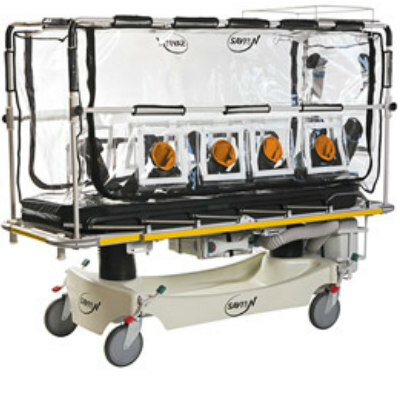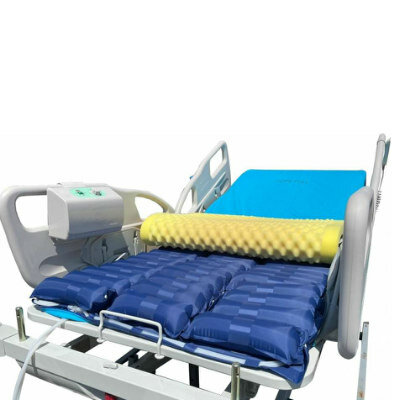First-Of-Its-Kind Device Repairs Leaky Tricuspid Heart Valve
|
By HospiMedica International staff writers Posted on 04 Apr 2024 |
.jpg)
The tricuspid valve is one of four heart valves and plays a vital role in controlling blood flow from the heart's right atrium to the right ventricle. Tricuspid regurgitation (TR), or a leaky tricuspid valve, arises when this valve fails to close properly, causing blood to flow backward in the heart. This can result in the heart overworking, leading to symptoms like fatigue and breathlessness that severely impact the quality of life. If left untreated, TR can lead to atrial fibrillation, and heart failure, and could be fatal. Now, an innovative, less invasive treatment solution is available for patients requiring tricuspid valve repair who may not be suitable for undergoing surgery.
Abbott’s (Abbott Park, IL, USA) first-of-its-kind TriClip transcatheter edge-to-edge repair (TEER) system has been designed specifically for the treatment of TR. TriClip utilizes the same clip-based technology as Abbott's MitraClip device which was designed specifically to treat the tricuspid valve's complex anatomy. Administered via a vein in the leg, the TEER technology involves clipping parts of the valve's leaflets together to repair the tricuspid valve, helping to correct the blood flow direction without performing open-heart surgery. Typically, TriClip recipients may spend just a day in the hospital post-procedure before heading home. TriClip offers a valuable treatment alternative for patients whose symptoms or TR persist despite medical therapy and who are deemed unsuitable for surgical options, thus enhancing their quality of life.
The U.S. Food and Drug Administration (FDA) has approved TriClip, based partly on findings from the TRILUMINATE Pivotal trial, the world's first randomized, controlled study for assessing TriClip's efficacy and safety against medical therapy in severe TR patients at intermediate or higher risk for open-heart surgery. Results showed that 90% of TriClip-treated patients saw their TR grade improve from severe to moderate or less within 30 days – a benefit maintained after one year. The trial also highlighted an excellent safety profile, with 98% of patients being free of major adverse events by the 30-day mark and experiencing notable quality-of-life enhancements. TriClip is approved in over 50 countries, including Europe and Canada, following its initial CE Mark in 2020 and has treated more than 10,000 individuals with TR.
"This approval helps address a treatment gap for people with tricuspid regurgitation who previously had few options to treat a disease that adversely impacted their daily lives and could lead to other deadly conditions," said Sandra Lesenfants, senior vice president of Abbott's structural heart business. "With the addition of TriClip to our broad structural heart therapy offerings in the U.S., we are continuing to bring meaningful, life-enhancing benefits to patients with cardiovascular conditions."
Latest Surgical Techniques News
- Hydrogel-Based Miniaturized Electric Generators to Power Biomedical Devices
- Custom 3D-Printed Orthopedic Implants Transform Joint Replacement Surgery
- Wearable Technology Monitors and Analyzes Surgeons' Posture during Long Surgical Procedures
- Cutting-Edge Imaging Platform Detects Residual Breast Cancer Missed During Lumpectomy Surgery
- Computational Models Predict Heart Valve Leakage in Children
- Breakthrough Device Enables Clear and Real-Time Visual Guidance for Effective Cardiovascular Interventions
- World’s First Microscopic Probe to Revolutionize Early Cancer Diagnosis
- World’s Smallest Implantable Brain Stimulator Demonstrated in Human Patient

- Robotically Assisted Lung Transplants Could Soon Become a Reality
- AI to Provide Heart Transplant Surgeons with New Decision-Making Data
- New Surgical Tool Empowers Precision and Confidence in Operating Room
- Future Muscle-Powered Surgical Robots Could Perform Minimally Invasive Procedures inside Body
- Non-Invasive Technique Combines Cardiac CT with AI-Powered Blood Flow for Heart Bypass Surgery
- New Signaling Method Enables Precise Localization of Miniature Robots and Surgical Instruments inside Body
- Novel Catheter System Enables Safer, More Cost-Effective Transseptal Procedures
- Magnetic Balloon Technology Optimizes Colonoscopy Procedural Outcomes
Channels
Artificial Intelligence
view channel
AI-Powered Algorithm to Revolutionize Detection of Atrial Fibrillation
Atrial fibrillation (AFib), a condition characterized by an irregular and often rapid heart rate, is linked to increased risks of stroke and heart failure. This is because the irregular heartbeat in AFib... Read more
AI Diagnostic Tool Accurately Detects Valvular Disorders Often Missed by Doctors
Doctors generally use stethoscopes to listen for the characteristic lub-dub sounds made by heart valves opening and closing. They also listen for less prominent sounds that indicate problems with these valves.... Read moreCritical Care
view channel
Deep-Learning Model Predicts Arrhythmia 30 Minutes before Onset
Atrial fibrillation, the most common type of cardiac arrhythmia worldwide, affected approximately 59 million people in 2019. Characterized by an irregular and often rapid heart rate, atrial fibrillation... Read more
Breakthrough Technology Combines Detection and Treatment of Nerve-Related Disorders in Single Procedure
The peripheral nervous system (PNS) serves as the communication network that links the brain and spinal cord to every other part of the body. It consists of two parts: the somatic nervous system, which... Read morePatient Care
view channel
Surgical Capacity Optimization Solution Helps Hospitals Boost OR Utilization
An innovative solution has the capability to transform surgical capacity utilization by targeting the root cause of surgical block time inefficiencies. Fujitsu Limited’s (Tokyo, Japan) Surgical Capacity... Read more
Game-Changing Innovation in Surgical Instrument Sterilization Significantly Improves OR Throughput
A groundbreaking innovation enables hospitals to significantly improve instrument processing time and throughput in operating rooms (ORs) and sterile processing departments. Turbett Surgical, Inc.... Read more
Next Gen ICU Bed to Help Address Complex Critical Care Needs
As the critical care environment becomes increasingly demanding and complex due to evolving hospital needs, there is a pressing requirement for innovations that can facilitate patient recovery.... Read moreGroundbreaking AI-Powered UV-C Disinfection Technology Redefines Infection Control Landscape
Healthcare-associated infection (HCAI) is a widespread complication in healthcare management, posing a significant health risk due to its potential to increase patient morbidity and mortality, prolong... Read moreHealth IT
view channel
Machine Learning Model Improves Mortality Risk Prediction for Cardiac Surgery Patients
Machine learning algorithms have been deployed to create predictive models in various medical fields, with some demonstrating improved outcomes compared to their standard-of-care counterparts.... Read more
Strategic Collaboration to Develop and Integrate Generative AI into Healthcare
Top industry experts have underscored the immediate requirement for healthcare systems and hospitals to respond to severe cost and margin pressures. Close to half of U.S. hospitals ended 2022 in the red... Read more
AI-Enabled Operating Rooms Solution Helps Hospitals Maximize Utilization and Unlock Capacity
For healthcare organizations, optimizing operating room (OR) utilization during prime time hours is a complex challenge. Surgeons and clinics face difficulties in finding available slots for booking cases,... Read more
AI Predicts Pancreatic Cancer Three Years before Diagnosis from Patients’ Medical Records
Screening for common cancers like breast, cervix, and prostate cancer relies on relatively simple and highly effective techniques, such as mammograms, Pap smears, and blood tests. These methods have revolutionized... Read morePoint of Care
view channel
Critical Bleeding Management System to Help Hospitals Further Standardize Viscoelastic Testing
Surgical procedures are often accompanied by significant blood loss and the subsequent high likelihood of the need for allogeneic blood transfusions. These transfusions, while critical, are linked to various... Read more
Point of Care HIV Test Enables Early Infection Diagnosis for Infants
Early diagnosis and initiation of treatment are crucial for the survival of infants infected with HIV (human immunodeficiency virus). Without treatment, approximately 50% of infants who acquire HIV during... Read more
Whole Blood Rapid Test Aids Assessment of Concussion at Patient's Bedside
In the United States annually, approximately five million individuals seek emergency department care for traumatic brain injuries (TBIs), yet over half of those suspecting a concussion may never get it checked.... Read more
New Generation Glucose Hospital Meter System Ensures Accurate, Interference-Free and Safe Use
A new generation glucose hospital meter system now comes with several features that make hospital glucose testing easier and more secure while continuing to offer accuracy, freedom from interference, and... Read moreBusiness
view channel
Johnson & Johnson Acquires Cardiovascular Medical Device Company Shockwave Medical
Johnson & Johnson (New Brunswick, N.J., USA) and Shockwave Medical (Santa Clara, CA, USA) have entered into a definitive agreement under which Johnson & Johnson will acquire all of Shockwave’s... Read more
















